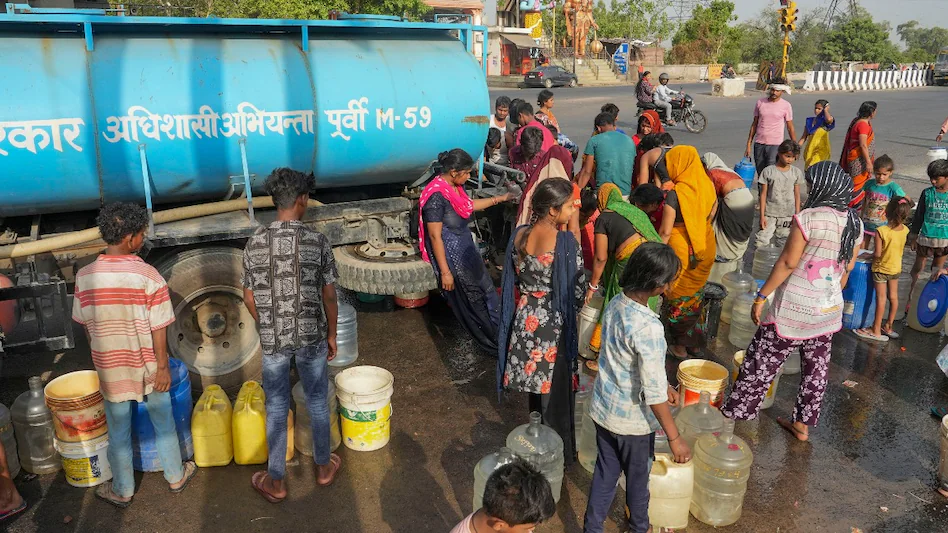Delhi, the capital of India, is grappling with a severe water crisis amidst its hottest summer on record, with temperatures soaring to 50 degrees Celsius. The situation is dire, with millions of residents struggling to access clean drinking water. The crisis is particularly acute in areas such as Chanakyapuri’s Sanjay Camp, Geeta Colony in East Delhi, Patel Nagar, Mehrauli, and Chhatarpur, where residents are facing long queues and limited access to water. Residents are expressing frustration, stating that even when water is available, it is often dirty and not suitable for drinking. Many are going without baths and are forced to rely on alternative sources, highlighting the vulnerabilities in Delhi’s water infrastructure. The crisis underscores the urgent need for sustainable water management practices to mitigate the effects of future heatwaves and ensure the well-being of Delhi’s residents.
Why is Delhi Facing a Water Crisis?
The Delhi water crisis has been exacerbated by the refusal of Haryana to release surplus water to the national capital. However, this is not an isolated issue; many cities across India are facing severe water shortages due to heatwaves. The increased power and water consumption during these heatwaves are significant contributors to the water crisis. Climate change is also a major factor, as it leads to overutilization and wastage of water resources .
The situation in Delhi is particularly dire, with residents struggling to access clean drinking water. The crisis has been exacerbated by the inefficiencies in Delhi’s water infrastructure, including water theft and wastage. The average Indian wastes 30% of their daily water requirement, and unnecessary wastage, such as the 6 liters of water used per toilet flush, further compounds the issue. According to a report, 160 million people in the country do not even have access to clean and fresh drinking water .
The political landscape has also been affected by the water crisis. Both the BJP and the Congress have launched “Matka Phod” protests against the AAP government, blaming it for the crisis. The protests are a manifestation of the intense political rivalry between the parties, with each side trying to capitalize on the issue to gain public support.

Read More: South Florida Flood Relief Efforts Underway as Weather Improves
Government Activity
The Supreme Court of India has stepped in to address the severe water crisis in Delhi. On June 1, 2024, the Court requested the state of Himachal Pradesh to provide 137 cusecs of surplus water to the national capital. The Supreme Court emphasized that there should be no politics involved in this matter and stressed the urgency of the situation. The Court’s order aims to facilitate the flow of water from Himachal Pradesh through Haryana and into Delhi via the Wazirabad barrage. The Supreme Court is actively working to resolve the Delhi water crisis, and it is expected that the HP government will soon release the surplus water as per the Court’s directive.
In addition to the Supreme Court’s intervention, the government has also taken several measures to address the water crisis in Delhi. These include:
- Increasing water supply from other sources:
- Exploring alternative water sources and increasing water supply from neighboring states.
- Enhancing water treatment and distribution capacity to meet the increased demand.
- Promoting water conservation:
- Launching awareness campaigns to encourage water conservation and efficient usage.
- Implementing measures to reduce water wastage, such as promoting the use of water-efficient appliances and fixtures.
- Improving water infrastructure:
- Investing in upgrading and maintaining the city’s water distribution network to reduce leakages and improve efficiency.
- Exploring the use of advanced technologies, such as smart metering and leak detection systems, to better manage water resources.
- Addressing the root causes:
- Addressing the underlying issues, such as climate change and unsustainable water usage patterns, to build long-term resilience.
- Promoting sustainable water management practices and policies to ensure equitable and reliable water access for all.
The government’s multi-pronged approach, combined with the Supreme Court’s intervention, aims to provide immediate relief and long-term solutions to the Delhi water crisis.
